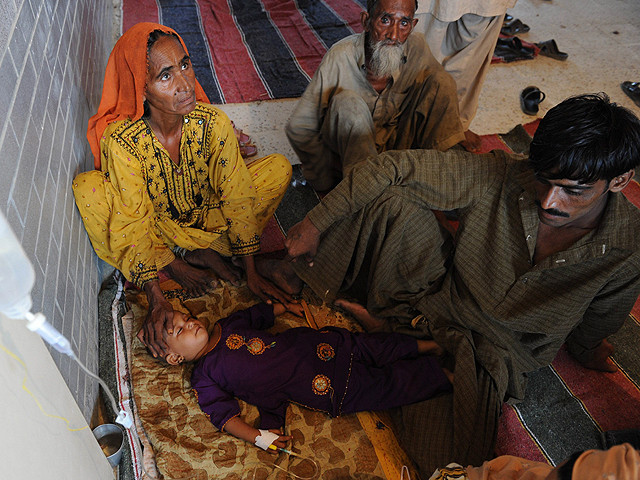Districts short of essential medicines
Around 80,000 people in the flood-hit areas of the Punjab have been diagnosed with water-borne diseases.

Around 80,000 people in the flood-hit areas of the Punjab have been diagnosed with water-borne diseases such as diarrhoea and gastroenteritis and other infections, said the official. He said the only medicines currently reaching flood victims were from international donors but they were not enough.
At the start of the floods, the Punjab government issued a set of “medicine protocols” which identify 61 medicines as essential for the flood-hit areas. The official said that over two dozen of these were missing from health facilities in the affected areas. “Eye infections have broken out and the department has only 1,200 eye drops for a population of 0.4 million,” he said. “In one district they need 0.5 million cyprophylux pills to treat gastroenteritis, but the Health Department has managed to get only 2,000 pills from donors.”
The provincial government issued orders stopping district and tehsil headquarters hospitals and rural health centres from purchasing their own medicines on a daily basis in November 2009. The government decided to purchase medicines centrally and then distribute them to the districts. This was meant to simplify the management of a Rs350 million project to provide free medicine to patients in government health facilities in the Punjab.
But it has resulted in hospitals stocked with unneeded medicines and short of drugs needed to curb epidemics, the official said. He added that several executive district officers for health had written to the Health Department asking that it reverse the decision, but the department had not responded.
The Health Department has purchased Rs60 million worth of essential medicines, but there were contradictory reports as to when they might get to the flood-hit areas. The Health Department official said that according to medical rules, antibiotics had to be tested and approved by a drug-testing laboratory and this typically took three weeks, so the drugs would not reach their targets before the second week of September. But Special Secretary Abdullah Sumbal said the department would try to get the lab to clear the medicine in a day in view of the emergency.
Published in The Express Tribune, August 16th, 2010.



















COMMENTS
Comments are moderated and generally will be posted if they are on-topic and not abusive.
For more information, please see our Comments FAQ